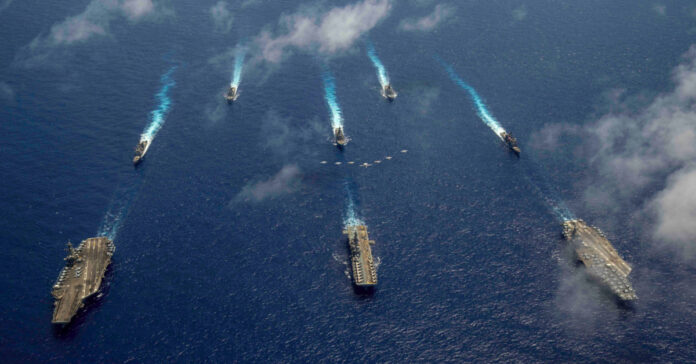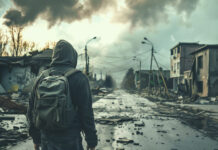I had planned to write about our garden and some other homestead topics today, but I’m shelving that for a day or two because of the impending outbreak of war between China and Taiwan, which may well include the United States and other countries in the Pacific.
As I write this on the evening of August 1, 2022, we do not know if, when, or how the Chinese will respond to Nancy Pelosi’s visit to Taiwan. This article assumes the worst, not because we are scaremongering, but because it is better to prepare for the worst-case scenario than to be surprised by when things are worse than we expected.
What Would War Look Like?
An attack on Nancy Pelosi, as odious as she is, or the sinking of an American aircraft carrier, would rile up Americans to such a great extent that Congress would declare war on China. This would not be a proxy war fought by Taiwanese, but by Americans who would go into harm’s way.
Our military would put into action detailed attack plans, and China would receive an updated version of the “shock and awe” treatment we gave Iraq thirty years ago. The U.S. would target Chinese ports, naval ships, airfields, and military depots in and along the South China Sea with thousands of missiles and airstrikes from ships, submarines, aircraft, and land-based systems. Our attack submarines would seek to sink their aircraft carriers and other capital ships while our fleet would attack theirs, and vice versa. We would meet them in aerial combat, but we would not seek to invade. We would seek instead to defang them and render them unable to fight. Then we would extort concessions from them.
China would respond to any such attacks, of course, but I doubt they are as ready as they think for a full-scale war with the United States, supported by Australia, the UK, Japan, and possibly India. Still, it would get ugly, and the cost would be high.
I think China knows this and instead will make a small strike that lets them make their point but has little chance of leading to a full-scale war. Then again, who can predict what China will do or how a small attack might be misinterpreted or snowball into something far worse? Better to be prepared than caught by surprise.
The Bigger Danger
War is terrible. It is costly, both in lives and treasure. It is ugly, both in its execution and its side effects and unintended consequences. I don’t want yet another war, certainly not of the scale that this could grow to.
The bigger danger is that a war between China and the U.S. could trigger a broader war. China could unleash North Korea. Iran could attack Israel (or vice versa) while our focus is elsewhere. Russia could invade the Baltics, knowing that our attention and our forces are busy elsewhere. That would leave NATO to defend Europe, and NATO is weak.
Worse yet, some country could unleash nuclear weapons. China or Russia, if they feel they are losing. Israel, if they think they cannot win without them. North Korea because, well, because they are North Korea.
(This might be a good time to review some of our nuclear war coverage, which we dusted off in light of recent threats from Russia.)
War Brings Change
Let’s remember several things: War can bring out the best in Americans. It can bring us together. It shows the populace who its leaders are and shines a light on those who fail to live up to the standard. A war may remind the world that this aging prize fighter still has a mighty left hook and a devastating jab. It could tilt the world stage back in our favor.
But at a great cost. A cost many would argue is too high a price to pay.
To which I ask, what is the cost of doing nothing? Or of getting knocked out by a sucker punch?
Please don’t get the idea that I support war, or I think it is the way to end inflation. That is not the case. I only seek to remind you that to the victor go the spoils. If there is to be war, the United States must do everything and more to ensure it is the victor. No more half measures.
Our Role as Preppers
As preppers, you and I have only one job during the time of war: to survive. We must shift from the prepper view, where we prepare to survive, to the survivalist mode, in which we actively practice survival.
In a full-scale war, either in the South Pacific or around the world, individuals and families here at home would face many threats and far more inconveniences. Here are just a few you should be ready to face:
- Attacks on the mainland from ballistic missiles, cruise missiles and hypersonic missiles, either conventional or nuclear.
- After an attack, you may become refugees or have to take in refugees.
- Cyberattacks, sabotage and other attacks on businesses, utilities, financial systems, transportation systems, communications, and our infrastructure, including dams, locks, and bridges.
- Attacks on our satellites and other space resources, leading to a loss or degradation of GPS services, broadcast coverage, and communications.
- The Internet and its underlying infrastructure may be attacked, hacked, or brought down. (Yes, everything you store in the cloud could disappear.)
- An immediate collapse of the stock market, driven not only by fear and uncertainty, but by massive losses among the many companies that rely on Chinese manufacturing and production.
- Shortages and outages that make the recent supply chain disruptions seem like child’s play. Expect all exports from China to stop and 80 percent of those from other Asian countries to cease as ocean transport becomes difficult and dangerous.
- Food shortages, rationing, and limits on the purchase of other goods used by the war effort. Look at rationing during World War II for examples.
- If the war lasts, we will see a recession leading to a depression, if not a total economic collapse. Yes, I know war-time economies are often strong, but I don’t see 20 or 30 million Americans finding jobs building munitions, drones, missiles, airplanes, landing craft, submarines, and ships. This may become a world war, but it will not be World War II all over again.
The Recovery
Win or lose, the recovery will be slow. It will take time to repair damage, to adjust to the changes in the world, to form new alliances, to rebuild factories and production, to regain our technological heights. The recovery may be less dangerous, but it will not be easy. We must survive the recovery as well as the war.
During both the war and the recovery, you will need your preps. You will need your stored food and any you can grow or raise yourself. The tools, the hardware, and gear you have stored will come in useful. So will the extra clothing and footwear you set aside, because there will be little new to be had. Your lives will change, and you may need those skills you practiced, whether it was shooting, gardening, setting a broken arm, or delivering a baby.
You have been preparing, possibly for years. If we go to war with China, you will have 24 hours to shift gears and focus on survival.
You will have to be tough, resolute, and appear unfazed by the challenges you face. In addition to modelling that same behavior, you must teach your spouse and children to react to adversity with strength, not weakness, self-pity, or despair. You may face challenges you never expected or be called upon to do things you never anticipated, and you must rise to the occasion. You will be tested, and you must not be found wanting. Your lives may depend on it.







